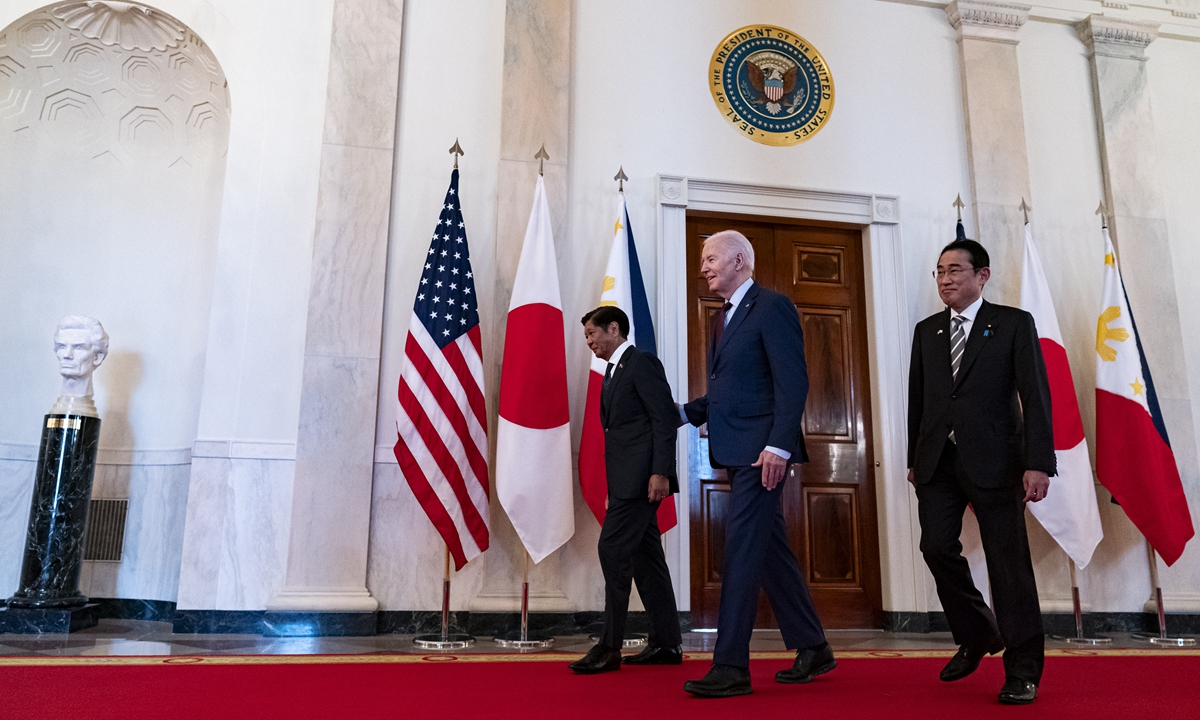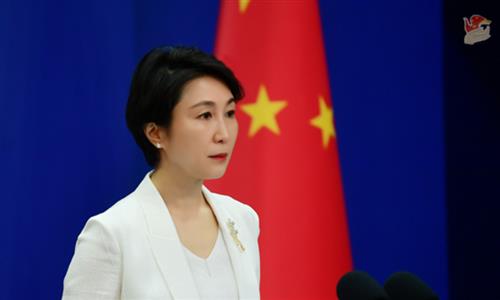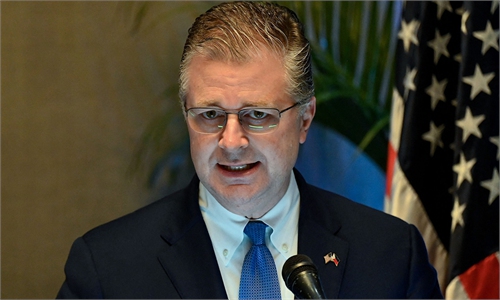Unrealistic for Philippines to encourage Chinese investment while provoke China, hype China threat with US, Japan: experts

US President Joe Biden, Japanese Prime Minister Fumio Kishida and the Philippine President Ferdinand Romualdez Marcos Jr, arrive during a trilateral meeting in the East Room of the White House in Washington, DC, on April 11, 2024. Photo: VCG
Experts warned on Sunday that it is unrealistic that the Philippines wants Chinese companies to invest, but also provokes China at sea and hypes the China threat at a trilateral summit with the US and Japan, after Philippine President Ferdinand Marcos Jr on Saturday insisted that business deals that the Philippines secured at a summit with Japan and the US will not affect China's investments in the country.
On Thursday local time, the leaders of the US, Japan and the Philippines held their first trilateral meeting at the White House in Washington, DC. The Philippines sought to obtain at least $100 billion in investment from the US and Japan.
Despite Marcos emphasizing that the summit "is not directed against any country" and instead is focused on deepening economic and security relations between the Philippines, the US and Japan, the three countries still directly mentioned China in their joint statement, hyping issues in the South China Sea, East China Sea and Taiwan Straits, and exaggerating the so-called Chinese threat.
However, during a press conference on Saturday, when asked whether the agreements between the Philippines, the US and Japan would affect China's investments in the Philippines, Marcos said that business deals secured by the Philippines at the summit with Japan and the US would not affect China's investments in the Philippines.
Experts said that the Marcos government's shift toward the US is a "major mistake," and the change in foreign policy will have a negative impact on the Philippines-China relationship, leading to a decrease in Chinese investments in the Philippines.
"No Chinese [businessman] will invest now because I know for a fact that many Chinese who intend to invest have put it aside already because they fear that their investments might be confiscated given the hostile environment," Harry Roque, the former spokesperson for former Philippines president Rodrigo Duterte, said to Al Jazeera.
It can be said that the Philippines has completely leaned toward the US in its foreign policy, placing itself under the US "Indo-Pacific Strategy" framework, Chen Xiangmiao, director of the World Navy Research Center at the National Institute for South China Sea Studies, told the Global Times on Sunday.
At the same time, based on the Philippines' own demands, there have been fundamental adjustments in its foreign policy, security strategy and maritime policy. The main aspects include taking more assertive actions at sea, increasing reliance on external forces to balance China, and daring to take more aggressive and tough actions at sea with the help of external forces, Chen said.
The Philippines wants Chinese companies to invest, but also wants to cooperate with the US in its containment of China, which is unrealistic, Chen noted.
The Philippines needs investment from Chinese companies, especially as the Marcos government is facing serious domestic issues such as food security, inflation, energy security, outdated infrastructure, the need for accelerated construction, and high unemployment rates, making Chinese investment very important, Chen said.
There are many signs in the Philippines indicating that Chinese companies have stopped or canceled their projects in the Philippines due to national sentiment and unfair treatment in policies, so Marcos' statement that it will not affect Chinese investment in the Philippines is empty words, the expert said.
However, whether economic support from the US and Japan will help Manila solve domestic economic pressures remains unknown, Chen warned.


